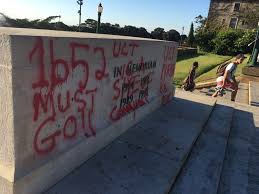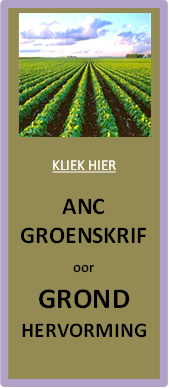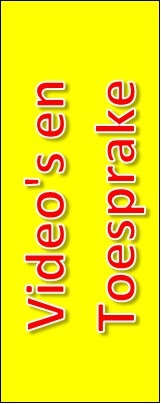Afrikaner
SUID AFRIKA IS NOU ‘N BETER PLEK AS VOOR 1994! ...... NÊ??
 Dieselfde as perdemis is droë vye? Glo u dit? As u dit nie glo nie, waarom glo mense soos F.W. de Klerk dit dan? Waarom sou jy iemand probeer oortuig om iets te glo wat nie waar is nie? Indien u wel in 1994 oortuig is dat dit die regte pad was en u sien hoe Suid Afrika rondom ons in duie stort, glo u dan nog steeds dat F.W. se aangeduide rigting reg was?
Dieselfde as perdemis is droë vye? Glo u dit? As u dit nie glo nie, waarom glo mense soos F.W. de Klerk dit dan? Waarom sou jy iemand probeer oortuig om iets te glo wat nie waar is nie? Indien u wel in 1994 oortuig is dat dit die regte pad was en u sien hoe Suid Afrika rondom ons in duie stort, glo u dan nog steeds dat F.W. se aangeduide rigting reg was?
As u nou oortuig is dat sy rigting verkeerd was en dat ons nie in die ‘93 referendum ‘n toegewing tot ons ondergang moes gemaak het nie, waarom bly ons verdeeld ten opsigte van die beginsel wat ons tot by 6 September 1966 op die kruin van voorspoed, vooruitgang, sukses en samehorigheid gebring het?
Kyk na die uittreksel uit die artikel hieronder en oortuig my dat die DA dit gaan stop, of dat AfriForum en/of Solidariteit of Stevie met hofsake of optogte hierdie neiging om te vat wat jou nie toekom nie, om elke reël en regulasie met minagting te ignoreer en om te brand, te vernietig en te moor asof dit ‘n reg is wat hulle toekom omdat ons volgens hulle, hulle verontreg het!
 Wil u nie u mede Afrikaner oortuig dat dit tyd is, nie om hande te vat, saam te staan,te onderhandel of saam te werk om Suid Afrika te maak werk onder hierdie bestel nie. Nee, om terug te keer na die Christelik-Nasionale beginselstandpunt van Afsonderlike ontwikkeling, sodat ons eers tenminste polities op mekaar afgestem kan wees. Dat ons wanneer ons uit innerlike oortuiging op mekaar afgestem is dat dít die regte politieke beginsel is waaroor ons almal saamstem, ons dan gesamentlik in verset kan kom teen die onreg wat teen ons gepleeg word. Want geen huis wat in homself verdeeld is sal staande bly nie!
Wil u nie u mede Afrikaner oortuig dat dit tyd is, nie om hande te vat, saam te staan,te onderhandel of saam te werk om Suid Afrika te maak werk onder hierdie bestel nie. Nee, om terug te keer na die Christelik-Nasionale beginselstandpunt van Afsonderlike ontwikkeling, sodat ons eers tenminste polities op mekaar afgestem kan wees. Dat ons wanneer ons uit innerlike oortuiging op mekaar afgestem is dat dít die regte politieke beginsel is waaroor ons almal saamstem, ons dan gesamentlik in verset kan kom teen die onreg wat teen ons gepleeg word. Want geen huis wat in homself verdeeld is sal staande bly nie!
The parliamentary Standing Committee on the Auditor General (AG) is considering more extensive powers for the AG, as irregular expenditure at national and provincial levels of government is spinning out of control.
Irregular expenditure – that is money spent in contravention of applicable legislation – has increased by 80% compared with the previous financial year and amounted to R46.36 billion. Fruitless and wasteful expenditure – which refers to money spent without any value derived by the entity – increased by 14% to R1.37 billion.
Unauthorised expenditure – which refers to money spent without it being budgeted for – decreased by 50% to R925 million.
IRREGULAR GOVERNMENT EXPENDITURE UP 80% TO R46BN
76% of departments in ill financial health.
Antoinette Slabbert / 17 November 2016 00:01
The parliamentary Standing Committee on the Auditor General (AG) is considering more extensive powers for the AG, as irregular expenditure at national and provincial levels of government is spinning out of control.
Irregular expenditure – that is money spent in contravention of applicable legislation – has increased by 80% compared with the previous financial year and amounted to R46.36 billion. Fruitless and wasteful expenditure – which refers to money spent without any value derived by the entity – increased by 14% to R1.37 billion.
Unauthorised expenditure – which refers to money spent without it being budgeted for – decreased by 50% to R925 million.
Committee chair Vincent Smith did not mince his words at the AG’s media briefing on Wednesday on the audit outcomes of 484 auditees for 2015/16. He said the AG is kind when he refers to irregular expenditure as ‘potential corruption’ or ‘conflict of interest’. “It is not potential, it is real,” he said.
Smith said the anti-corruption task team, which includes the Department of Public Service and Administration, the Hawks and the Department of Planning Monitoring & Evaluation – which is situated in the Presidency – will in future attend the meetings of the committee and the Standing Committee on Finance (Scopa). The task team will be there to confirm whether cases have been referred to it, as accounting officers often assure the committees.
The task team would further report back every quarter on progress made in investigating corruption.
AG Kimi Makwetu said his office has powers to audit and report. It does not have powers like to Public Protector to investigate and institute binding remedial action. One of the areas that could be strengthened is for investigations to be made mandatory within a set timeframe by the appropriate agency, once the AG reports an issue.
Currently there are no consequences. Investigations take very long to complete and the approach where the AG reports and expects the accounting authority to do the right thing by launching an investigation and rooting out corruption, simply doesn’t work, Makwetu said.
He said irregular expenditure usually constitutes a deviation from supply chain management requirements on the basis of an emergency, sole supplier arrangements, a failure to get competitive quotes, extensions to existing contracts and over-paying for goods and services.
Deviations could be condoned in the case of a real emergency, but should otherwise be investigated and recovered. Currently these measures are no deterrent, due to a lack of coordination and because the investigations take too long to come to a conclusion.
The top contributors to irregular expenditure in 2015/16 were:
Passenger Rail Agency of SA (Prasa) R13.9 billion
KwaZulu-Natal Department of Health R2.5 billion
Gauteng Department of Human Settlements R2.3 billion
Gauteng Department of Roads and Transport R2 billion
Mpumalanga Department of Health R1.9 billion
Department of Water and Sanitation R1.7 billion
Makwetu said inefficiencies, as reflected in fruitless and wasteful and irregular expenditure, impacted on the financial health of entities. “If you don’t use the money for the purpose it should have been used, you are going to need other money.”
He said the AG rated 75% of departments and 39% of public entities as either concerning or requiring intervention with regard to financial health. This is a regression, as 53% of departments were similarly rated in the previous financial years.
“The signs of poor financial management are apparent in the increasing occurrence of deficits, departments funding cash shortfalls from the following year’s budget, poor revenue management and inability to pay creditors within the required 30 days,” Makwetu said. “In total, 5% of departments and 10% of public entities were in a particularly poor financial position by the end of 2015/16, with material uncertainty regarding their ability to continue operating in the foreseeable future. This remained unchanged from the previous year.
The report covered 484 auditees, including 169 national and provincial departments and 315 public entities with a total budget of R1.2 trillion.
A total of 27 audits were not completed in time to be included in the report and 18 of those were still in progress. The delays are the result of non-submission or late submission of financial statements and information, and in some cases disagreements on accounting matters.
The number of clean audits increased consistently over the last five years. A total of 152 auditees received a clean audit in the reporting period, compared with 137 in the previous financial year.
There was also a drastic increase in the number of disclaimers to 27, compared with five in the previous financial year and even fewer in the previous three years.










